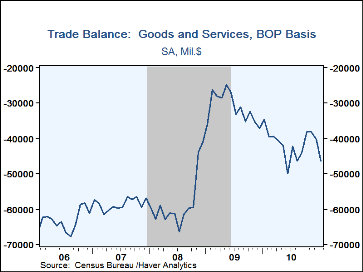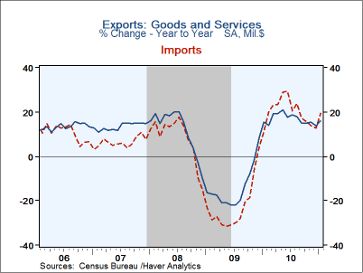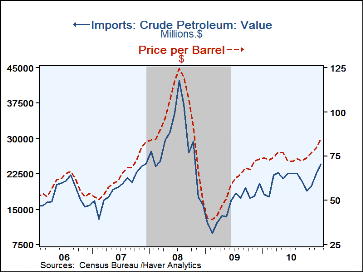 Global| Mar 10 2011
Global| Mar 10 2011U.S. Trade Deficit Deepens Further Due To Higher Oil Prices
by:Tom Moeller
|in:Economy in Brief
Summary
The U.S. foreign trade deficit deepened during January to $46.3B versus a little-revised $40.3B in December. Consensus expectations had been for $41.5B. Economic improvement abroad and the lower value of the dollar helped exports jump [...]
The U.S. foreign trade deficit deepened during January to $46.3B versus a little-revised $40.3B in December. Consensus expectations had been for $41.5B. Economic improvement abroad and the lower value of the dollar helped exports jump 2.7% (15.9% y/y) following a 1.9% December increase. Imports rose 5.2% (12.8% y/y) with higher oil prices, the largest monthly increase since March 1993. In chained 2005 dollars, the overall deficit in goods deteriorated to $49.5B from $46.0B in December.
The primary factor causing last month's deficit deterioration was higher oil imports. The 10.1% m/m increase reflected a rise in the average price for a barrel of crude oil to $84.34 from $79.78 in December. Twelve months earlier prices averaged $73.89. The total value of crude petroleum imports rose more-than one third as the quantity also jumped 18.5% with the firmer economy.
Overall imports rose 5.2% (19.3% y/y). Goods imports rose 6.0% (22.1% y/y) but when adjusted for higher prices imports rose a lesser 4.1% (16.5% y/y). Nominal imports of foods, feeds & beverages increased 6.1% (17.3% y/y) though when adjusted for higher prices the y/y gain was only 2.7%. Nonauto capital goods imports jumped 5.3% and nearly all of the 24.3% y/y increase reflected higher volume. Nonauto consumer goods imports rose 2.2% (13.8% y/y) and all of the annual increase was real. Auto imports rose 14.0% (29.9% y/y) and, again, it was all volume.
Total exports rose 2.7% (15.9% y/y) after a firm 1.9% December increase. The 3.3% rise (19.8% y/y) in goods exports reflected a 10.2% increase (36.6% y/y) in industrial materials, a 13.4% gain (22.2% y/y) in auto exports and a 0.7% increase (17.5% y/y) in foods, feeds & beverages. Capital goods exports fell 1.0% in January (+12.6% y/y) and nonauto consumer goods fell 3.8% (+3.2% y/y).
Services exports rose 1.0% in January (6.9% y/y). As more foreign citizens visited the U.S., travel exports rose 1.3% (8.4% y/y) and passenger fares jumped 4.0% (20.1% y/y). Imports of services rebounded 1.2% (6.6% y/y). Travel imports rose 0.7% (0.8% y/y) and passenger fares rose 3.6% (12.5% y/y).
By country, the goods trade deficit with China deteriorated to $23.3B as exports rose 17.3% y/y and imports rose by one-quarter. (Imports are roughly four times the level of U.S. exports.) The trade deficit with Japan also deteriorated to $5.0B as exports rose a reduced 3.3% and imports fell 12.2% (21.9% y/y). (Imports from Japan are roughly twice the level of U.S. exports.) The trade deficit with the European Union eased to $5.6B as U.S. exports grew 8.6% y/y and imports fell 10.2% (20.6% y/y). (Imports from Europe are roughly one-third larger than U.S. exports.)
The international trade data can be found in Haver's USECON database. Detailed figures are available in the USINT database.
| Foreign Trade | Jan | Dec | Nov | Y/Y | 2010 | 2009 | 2008 |
|---|---|---|---|---|---|---|---|
| U.S. Trade Deficit | $46.3B | $40.3B | $38.2B | $34.6B (1/10) |
$495.7B | $374.9B | $698.8B |
| Exports-Goods & Services(M/M) | 2.7% | 1.9% | 1.0% | 15.9% | 16.8% | -14.6% | 11.5% |
| Imports-Goods & Services | 5.2 | 2.6 | 0.8 | 19.3 | 19.7 | -23.3 | 8.0 |
| Petroleum | 10.1 | 16.8 | 6.9 | 31.7 | 32.4 | -44.0 | 37.0 |
| Nonpetroleum | 5.0 | 0.3 | 0.0 | 19.9 | 20.7 | -20.9 | 1.5 |
Tom Moeller
AuthorMore in Author Profile »Prior to joining Haver Analytics in 2000, Mr. Moeller worked as the Economist at Chancellor Capital Management from 1985 to 1999. There, he developed comprehensive economic forecasts and interpreted economic data for equity and fixed income portfolio managers. Also at Chancellor, Mr. Moeller worked as an equity analyst and was responsible for researching and rating companies in the economically sensitive automobile and housing industries for investment in Chancellor’s equity portfolio. Prior to joining Chancellor, Mr. Moeller was an Economist at Citibank from 1979 to 1984. He also analyzed pricing behavior in the metals industry for the Council on Wage and Price Stability in Washington, D.C. In 1999, Mr. Moeller received the award for most accurate forecast from the Forecasters' Club of New York. From 1990 to 1992 he was President of the New York Association for Business Economists. Mr. Moeller earned an M.B.A. in Finance from Fordham University, where he graduated in 1987. He holds a Bachelor of Arts in Economics from George Washington University.
More Economy in Brief
 Global| Feb 05 2026
Global| Feb 05 2026Charts of the Week: Balanced Policy, Resilient Data and AI Narratives
by:Andrew Cates










